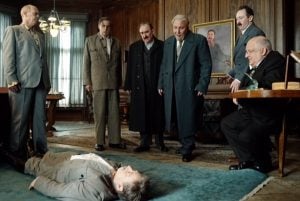
The Death of Stalin is the latest offering from Armando Ianucci; a pitch-black comedy about the great tyrant’s death. If that sounds like a slightly bizarre subject for a man of Ianucci’s comic sensibilities, rest assured this comedy of human inadequacy and bureaucratic tyranny proves a largely excellent fit for his style.
It takes about a minute to realise that the film, in many ways, adheres quite rigidly to The Thick Of It formula. It’s blustering hypocrisy, the idiotic rambling, running around in ill-fitting suits – even down to the withering, acidic putdowns that are an Ianucci staple: ‘Flesh-lump in a waistcoat’. What is different, however, is that the stakes are now raised considerably. Whereas before the worst our characters might get is a particularly sharp take-down from Malcolm Tucker, our characters here have the very real threat of execution hanging over their heads. A threat which certainly adds an element of desperation to the characters’ actions.
Yes, one couldn’t accuse the film of shying away from the more morbid aspects of the very real-life history which it takes from. Or perhaps for forgetting the complicity of our heroes in the rule of terror that Stalin imposed on the people of Russia. Yet, there are moments when we’re confronted with the true horror of Stalin and his successors’ reign and the tonal whiplash is palpable. That’s not to say that comedy can’t make light of dark topics or moments in history, Four Lions being one example. However, only that it can be difficult to reconcile these elements in a wholly satisfying way and, I would argue, The Death of Stalin doesn’t always manage this effectively. Which is a shame, because when it works; it really works.
But make no mistake: The Death of Stalin is frequently hilarious. Much like The Thick of It, it can often feel depressingly accurate in its depiction of politics. Ianucci’s script is well tuned and his preternatural ability to write a toxic, witty, and spiteful barb certainly hasn’t diminished. What is rather new and unexpected, but completely welcome, is a healthy dose of physical, almost slapstick, humour.
Speaking of unexpected but welcome surprises, Ianucci has certainly upped his game with regards to the look and general production of the film. While In The Loop (the film based on The Thick Of It) played and looked like an extended episode of the show, The Death Of Stalin feels unmistakeably cinematic and is well lensed and scored. Ianucci has also assembled some top-draw talent to fill out the cast of conniving, incompetent, and malicious characters rushing to fill the vacuum that Stalin has left in his wake. Buscemi is predictably superb as Nikita Kruschev, bringing all his wiry, nervous humour to the role. Simon Russel Beale, too, is perfect as the scheming sleazeball Lavrentiy Beria. The stand-out, however, has to be Jason Isaacs. Sporting a thick Yorkshire accent as macho general Georgy Zhukov who steals every scene he’s in, displaying hitherto unknown comedic chops while still communicating the character’s inner steel.
Andrea Riseborough as Stalin’s daughter Svetlana is perhaps the only member of the cast who could feel short-changed. Given next to nothing to do and little character to work with, she feels strangely superfluous to the proceedings. A point emphasised by the ending in which previous hints suggested there might be some pay-off for her character; a pay-off which, somehow, never arrives. On the accents, The Death of Stalin bothers little with them. The actors simply speak with their own voices (other than the aforementioned Isaacs). Yet, this is something which works in its favour. Seeing Joe Stalin speaking in a thick cockney accent is a prime example: the strange disconnect of it shouldn’t work, but completely does.
On a separate note, while the film is certainly accessible to those uninitiated in the minutiae of Russian politics circa 1953, as I most certainly was, one suspects that history buffs may get slightly more out of it. If only to laugh at the dissonance between Ianucci’s buffoonish caricatures and their real-life counterparts who, one can be fairly certain, were a less humorous bunch than the ones on screen.
Filed under: Film, TV & Tech
Tagged with: film, film review, HOME, homemcr, manchester, Political film, The Death of Stalin



Comments